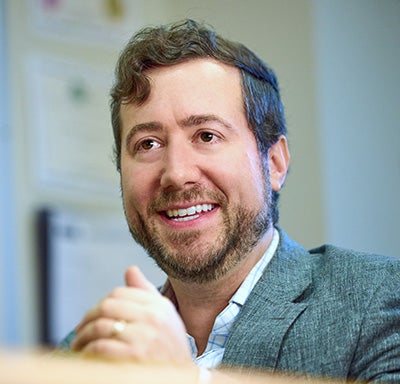
Mark Shlomchik, Distinguished Professor of Immunology, University of Pittsburgh School of Medicine. Photography courtesy of Shlomchik.
Mark Shlomchik, Distinguished Professor of Immunology, University of Pittsburgh School of Medicine, is one of 11 primary investigators awarded research funding from the Lupus Research Alliance’s (LRA) new Targeted Research Program on Engineered Cell Therapies for Lupus (TRP-ECT).
LRA is the world's largest nongovernmental, nonprofit organization dedicated to lupus research and is committed to revolutionizing treatment through cutting-edge research. The organization supports diverse scientific talent to advance discoveries for better diagnostics, improved treatments and ultimately a cure for lupus. TRP-ECT was created to support the development of safe and accessible new cell therapies for lupus and funds preclinical studies and additional research related to ongoing or completed clinical trials.
Shlomchik’s research, in collaboration with Jason Lohmueller, assistant professor of surgery, School of Medicine—an expert in Chimeric Antigen Receptor (CAR) T cell development in the Hillman Cancer Center—will test a new CAR T cell therapy in lupus mouse models to target and remove Age-associated B cells (ABCs), which are associated with the clinical severity of lupus.

Jason Lohmueller, assistant professor of surgery, School of Medicine. Photography by Joshua Franzos.
Lupus is an autoimmune disease where the immune system starts to attack the body's organs like the kidneys, lungs and skin. In lupus, the immune system’s B cells have a dual nature. Some B cells produce harmful autoantibodies—antibodies mistakenly attack the body’s healthy cells and tissues—and inflammatory factors. Meanwhile, other B cells potentially offer protection by helping to reduce inflammation.
Shlomchik’s work in lupus animal models showed that B cells are the major drivers of autoimmune diseases like systemic lupus erythematosus (SLE). Thus, depleting these harmful B cells is a major therapeutic goal. Recent research has also shown that CAR T cells that target B cells for destruction—originally developed to treat cancers that start in B cells, called B cell malignancies—can also treat lupus. However, these treatments eliminate all the patient’s B cells, which can leave the patient immunosuppressed.
Shlomchik’s research seeks to create a more sophisticated and safer lupus treatment that removes harmful B cells and preserves the beneficial ones.
“Jason Lohmueller and I are very excited to receive this ‘Experimental Cell Therapy’ grant from the Lupus Research Alliance,” Shlomchik said. “Our goal, supported by this LRA grant, is to develop a next-generation CAR T cell that only depletes a subset of B cells that are likely to be the disease-causing culprits in SLE,” he added. “If successful, this could one day be turned into a much more specific, effective and safer treatment for patients with SLE and other autoimmune diseases.”
